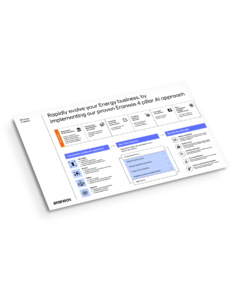Balancing opportunities and risks
When does facial recognition become spying? Does customer profiling lead to discrimination? Ethics and data are a complex combination due to different societal perspectives and values, such as privacy versus security. Organizations can only make responsible choices by developing a clear vision of what is good for the individual, the organization and society. In the first part of this diptych, we discuss what data ethics is, why there are different views on it, and how ethical standards and values can serve as a basis.
Data can provide many benefits and opportunities for organizations in all sectors. Data help us solve problems, such as the energy challenge, the housing shortage and the nitrogen approach. Technological developments in recent years have led to the automation of processes, improved communication and collaboration tools and advanced analytical techniques. The use and collection of data has an important role in this. This offers many opportunities, but if deployed without careful consideration, it can also pose risks.
Examples of risks in the use and collection of data include privacy breaches, data breaches, widening the gap in digital inequality, cybersecurity risks and function creep (where data is (un)consciously reused without consent for a purpose other than previously agreed upon). Even the most innovative data models can unknowingly cause bias or inequality, or wrongly influence decisions. A well-known Dutch example is to allowance affair, in which thousands of families got into financial trouble because of an unjustified decision by an AI tool.
What is data ethics
What is ethical good behavior? That question is difficult for many organizations to answer. Responsible ethical behavior regarding data is often a gray area and depending on different perceptions, norms and values in society. For example, do we choose security over privacy, or the other way around? This is not just about AI and data-driven algorithms; rather, it is mainstream information processing that presents numerous ethical challenges.
Data ethics is a way to be accountable, transparent and open, higher quality, and inclusive as an organization. Because you want to connect to the wants and needs and protect values of the users and the people who are most affected.
Ethics goes beyond the law
Many discussions about the ethical use of data are legal and are about compliance. However, compliance and ethics are two different concepts, although they are often linked in organizations. Compliance refers to adherence to laws, rules, regulations and internal policies. It is intended to bring an organization into compliance with external requirements and internal guidelines.
Ethics, unlike compliance, refers to the moral principles, values and standards that determine what is considered responsible or irresponsible. Ethics goes beyond the law and focuses on what feels right and just. Often focusing on the intentions and consequences of actions and possible impact on society where you can ask this question, “Is this desirable?
Different for everyone
In practice, what is desirable and what is not is a discussion with much nuance. As a result, it is not always immediately clear what the right thing to do is. These are some practical examples showing that acting ethically with data is not always clear to different stakeholders.
- In 2016, 70,000 profiles from the dating platform OkCupid with personal data were shared on a public platform. Researchers defended this because the information was already public, but the public felt it was unethical for identifiable personal data to be shared without consent.
- SCOMPAS assesses recidivism risk among criminals. Analysis of 10,000 cases showed that the algorithm unfairly gave people of color higher risk scores, while white criminals received too low scores. The company denies bias, but concerns about possible racism remain.
- American retailer Target analyzed store data to predict buying trends. They discovered a teenage girl’s pregnancy before her father knew, by sending her discount coupons for baby products. Although it was legal, the public felt this predictive marketing was an invasion of privacy.
Ethical standards and values as a basis
The question of what ethical behavior is may be difficult to answer, but we can provide a definition. By ethical behavior, we mean making responsible choices based on our individual values, doing the right thing, treating others right and showing morality in one’s personal life. Ethical values are principles that define what is considered right or wrong in a particular society or context. These principles include, for example, fairness, respect For autonomy and justice. Everyone has different ethical principles that give us influence behavior and our ethical values.
In addition, these values also depend on cultural, religious or individual perspectives, but they form the basis of many ethical considerations in societies and organization. Our behavior depends not only on values, but also on norms. Ethical norms are the rules of conduct that stem from our values. Norms and values serve as a common ground that people in a organization can share. When individuals have similar norms and values, the there is a greater chance that they will understand, respect and follow each other’s behavior and decisions. This common understanding is the basis for trust in the organization. But it is also important for an organization to radiate this trust to society.
Norms and values serve as a common ground that people in a organization can share. When individuals have similar norms and values, the there is a greater chance that they will understand, respect and follow each other’s behavior and decisions. This common understanding is the basis for trust in the organization. But it is also important for an organization to radiate this trust to society.
How does an organization contribute to such an open society by managing data ethics well? In this series on data ethics, we look at what the moral pillars of an organization are, what the responsibilities are and how organizations can build an ethics program. You can read the second article in our series on Data Ethics here.




